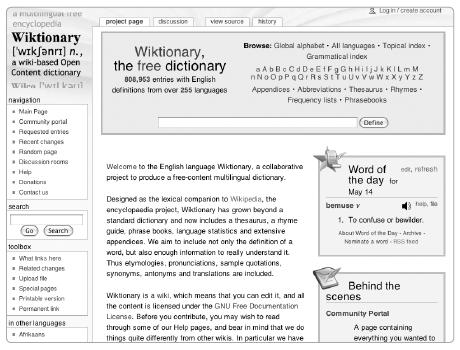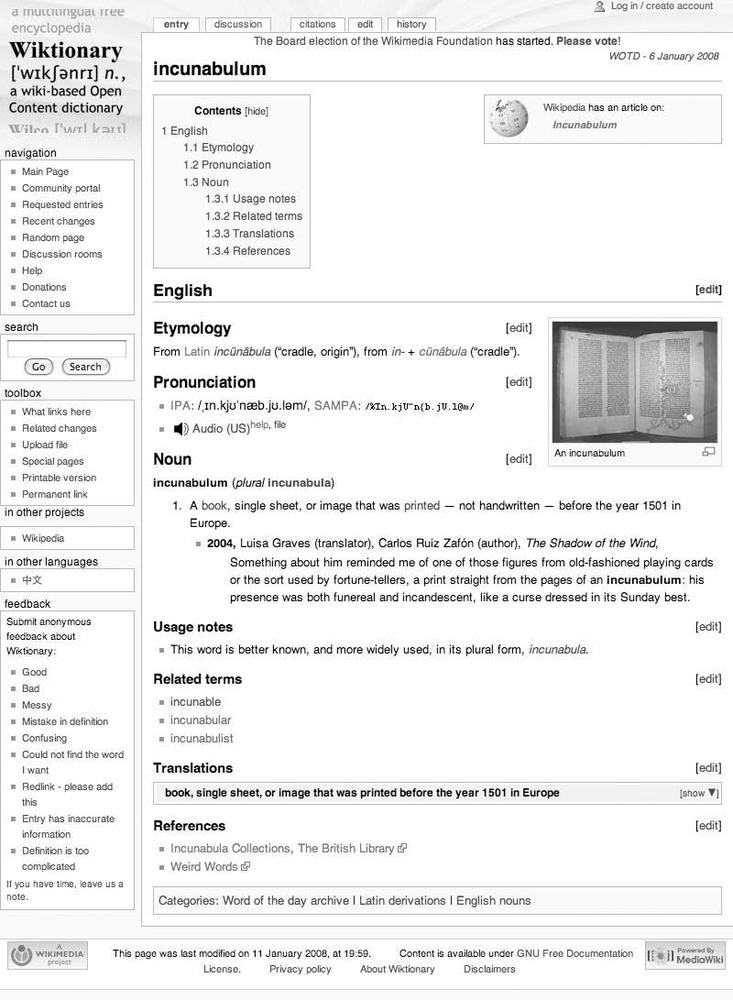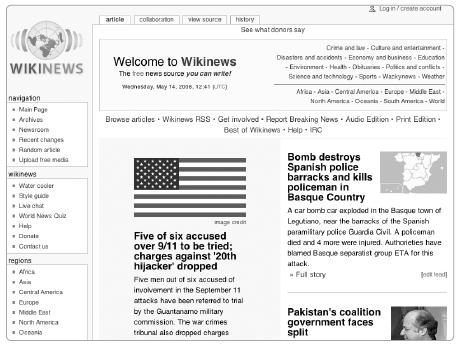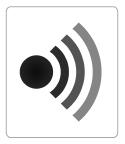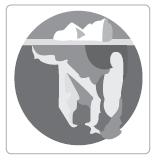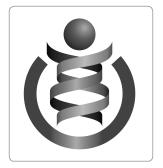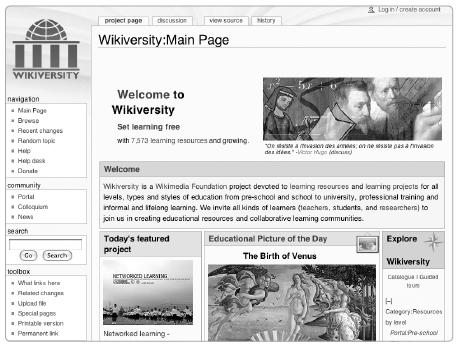Besides Wikimedia Commons, Wikipedia has seven additional sister projects. From a Wikipedian perspective, these projects are less close to the work of the encyclopedia. These projects serve as reference sites licensed under the GFDL, covering different types of content. The exception is Wikinews, which is a citizen journalism site now using a Creative Commons license. Six of the projects have versions in many languages, as Wikipedia does, with the exception of Wikispecies, which maintains a single site. You could think of MediaWiki software development as yet another sister project, with the obvious difference being that it exists to develop and distribute a program, not content.
If your interests are more lexicographic than encyclopedic, you should visit Wiktionary (Figure 16-3), a free wiki-based dictionary. Instead of full articles about a topic, Wiktionary provides concise word definitions. Wiktionary's scope overlaps with Wikipedia: A term with an article in Wikipedia may also be defined in Wiktionary. For instance, whereas the Wikipedia fish article discusses types of fish, where they can be found, fishing methods, and so on, the Wiktionary definition will tell you that fish in English can be a noun or a verb, that a fish is a cold-blooded animal that lives in water, how to pronounce it, and so on. The English-language Wiktionary had over 878,000 entries as of mid-2008, though many of those had been imported from public-domain dictionaries by bots.
For Wikipedians, Wiktionary provides both a resource to link to for further information about terms that appear in both projects and a place to move articles that are simply short dictionary definitions and therefore unsuitable for Wikipedia articles.
Wiktionary is a multilingual dictionary (also thesaurus and phrase-book) and has distinctive content policies. Words must be attested and idiomatic (that is, words should be in use, and phrases should be commonly used idioms), and submissions should be neutral and verifiable. Although definitions and descriptions in the English-language Wiktionary are in English only, words from any and all languages can be included: Wiktionary not only defines English words but also serves as a French-English dictionary, a Spanish-English dictionary, and so on. Thus the site can be an excellent place to look up unfamiliar foreign words; as of 2008, words in 104 languages were included in the English-language Wiktionary. Additionally, when viewing an entry, the In Other Languages links on the left-hand sidebar will take you to definitions in other languages of the same English word (similarly to Wikipedia), and generally these entries will also link to the local equivalent of the word. Translations in other languages may also appear at the bottom of the entry.
Wiktionary, unlike most other dictionaries, includes supplementary data in definitions, including sound files of pronunciations, images, links to the other projects (often Wikipedia), translations, and other information such as usage notes and references (Figure 16-4 shows these elements in the entry for incunabulum). Compound words, idioms, and abbreviations are all acceptable; neologisms that have references to current use may be included (naturally, made-up words will be deleted). Featured entries are highlighted as the Word of the Day on the main page; for the English-language Wiktionary, an RSS feed of these interesting words is available.
Wiktionary was proposed on the Wikipedia-L mailing list in April 2001 by Larry Sanger, just three months after Wikipedia was launched. [34] The site was brought online in English on December 12, 2002; on March 29, 2004, the first non-English Wiktionaries were initiated in French and Polish. Wiktionaries in over 200 languages now exist, and more than 100 have more than 100 definitions. An outside project called Omegawiki, started by a handful of Wiktionarians, is working on a grand combination of data from Wiktionary into a single dictionary for all languages.
Wikinews is a wiki site devoted to news and citizen journalism (Figure 16-5). The project aims to report and summarize news on all subjects from a neutral point of view, providing a free-content alternative to proprietary news agencies. Anyone can contribute, either from direct experience or by summarizing from elsewhere. In terms of content policy, Neutral Point of View (NPOV) and Verifiability (V) apply to content on Wikinews, but Wikinews differs from Wikipedia in that original reporting is welcomed. The site aims to provide a stable news source, so after articles have been drafted, they are published, with the expectation that major changes will not be made to the article once they have been published for 36 hours. After a week, articles are archived and "frozen" (protected against further editing).
Also unlike Wikipedia, original articles may be signed with the reporter's byline. Wikinews has developed several features over the years to make original reporting easier, including a 1-800 number tipline and a process for accrediting reporters. To become accredited, a contributor must be established and submit to a process with a community vote; his or her identity may be verified by other trusted Wikinews reporters.
Wikinews stories may link (sparingly) to Wikipedia articles for definitions and further information; in turn, Wikipedia articles about a current topic should link to the appropriate Wikinews story, if one exists. Wikinews articles may be cited in Wikipedia articles. Breaking news is better suited to Wikinews, but you will often see stories about current events developing in both places simultaneously. Wikinews is better for some topics, however; a person may be briefly "in the news" as reported on Wikinews, without meriting a biography in Wikipedia. Also unlike Wikipedia (and the rest of the Wikimedia projects), Wikinews uses the Creative Commons Attribution 2.5 license, which is also a free license. This means that content from Wikipedia generally cannot be copied directly to Wikinews, however.
The idea of a Wikinews site was first proposed in 2003; after much discussion, a demonstration wiki was established in November 2004 to show how such a collaborative news site might work. In December 2004, the site was moved out of the demo stage and into the beta stage. A German-language edition was launched at the same time. Soon editions in Dutch, French, Spanish, Swedish, Bulgarian, Polish, Portuguese, Romanian, Ukrainian, Italian, Serbian, Japanese, Russian, Hebrew, Arabic, Thai, Norwegian, and Chinese (in that chronological order) were set up; currently Wikinews has sites in 23 languages altogether.
Wikibooks is a wiki for the creation of free-content textbooks and manuals (Figure 16-6 shows its logo). The books range from how-tos to textbooks for learning subjects such as math, computer science, or languages, to cookbooks of recipes from around the world. Wikibooks is only for instructional works such as textbooks, annotated texts, instructional guides, and manuals; fiction and many types of nonfiction are not included. Original research is also not acceptable; Wikibooks is not the place for publishing primary research or results. Out-of-copyright source texts are better placed at Wikisource, with the exception of annotated texts designed for study. Like all the projects, all Wikibooks materials should have a neutral point of view; but unlike Wikipedia, writing extensive descriptions of how to do something or the best way to learn a process is perfectly acceptable.
Wikibooks has no fixed audience, unlike Wikipedia, which aims to appeal to a broad base. Though many books are designed for adult learners, books may be for any audience, including children. One special project hosted on Wikibooks is called Wikijunior, which is a collection of nonfiction books for children. Wikijunior projects have been created in 8 languages, with 25 Wikijunior books in English completed or underway. This project was originally started with a special grant in 2004 from the Beck Foundation to help support development of children's books. Other Wikibooks may be technical, specialist works.
Wikibooks uses modules, or short sections of the book (akin to a short chapter), as the main structure for the site. Each book has a single main page on the wiki, and each module is built as a subpage of that page. A special visual grading system with small squares (Figure 16-7) indicates how finished the works are; see http://en.wikibooks.org/wiki/Help:Development_stages.
Extended topic discussions or instructions on how to do something may be moved to Wikibooks from Wikipedia. In turn, books on Wikibooks can link back to the relevant Wikipedia articles for background information, and images from Commons may be used for illustrating Wikibooks when needed.
Wikibooks sites exist in over 100 languages, and 47 of these sites have more than 100 modules. The project was first begun in 2003 in response to a request for a place to create textbooks; in 2006, Wikiversity (described on Linking Between Projects and Copying Content) was spun off as a separate project.
Wikiquote aims to compile a collection of quotations from notable people and works (Figure 16-8 shows its logo). Quotations can come from published works, such as books and films, but can also include proverbs, epigrams, and sayings. For instance, at [[Category:Proverbs]] on http://en.wikiquote.org/, you can find proverbs from many languages, both literally translated and rendered as the English equivalent. Quotes and sayings are arranged by theme or by author; for instance, Wikiquote has a page called Love, which has quotes relating to the theme of love, and a page collecting Samuel Beckett quotations.
Quotes should be sourced to the work they originally appeared in whenever possible, and they should only come from notable people or works. As with all the Wikimedia wikis, links to the appropriate articles on Wikipedia and elsewhere should be included. Many Wikipedia articles for well-known works and authors also include a few quotes, but if many notable quotes come from one person, they should primarily be included on the Wikiquote page, with an appropriate interwiki link from the Wikipedia article.
Wikiquote was started in 2003. At the end of 2007, Wikiquotes editions had been created in 89 languages, with 46 of them having more than 100 articles. The English-language Wikiquote has over 14,000 pages. The English Wikiquote also has a Quote of the Day feature that displays a new notable quote each day; you can even receive this by email.
Wikisource is a collection of source documents and primary texts that are in the public domain (and thus not covered by copyright) or released under the GFDL. (Figure 16-9 shows its logo.) The project serves as a free library of important works. Texts may include (but are not limited to) novels, nonfiction, letters, speeches, historical documents, constitutional documents, and laws. Translations are also welcome, though texts in original languages should go to the appropriate language Wikisource. Texts must be previously published to be included here; Wikisource does not host vanity press books or documents produced by its contributors. Spoken or audio versions can be included; you can browse these at [[s:Category:Spoken works]].
Usually texts are in the public domain in the United States because they are old enough that they are no longer covered by copyright. The texts may have also been released into the public domain in the first place, such as US government–produced materials (for instance, federal court opinions and military journalism). Many texts on Wikisource come from existing digital libraries and scanning projects, such as Project Gutenberg. Digitizing free texts from scratch is also certainly acceptable. Texts may be scanned and then converted to an editable digital format with Optical Character Recognition (OCR) software. Texts produced with OCR do need to be proofread.
Wikisource was originally conceived of as a way to store useful historical or otherwise important public domain texts, both as a supplement to Wikipedia and as an archive in its own right. For instance, the Wikipedia article on the US Constitution may link to the full text of the Constitution at Wikisource. This provides a valuable addition to the article for readers who want to learn more about the topic. Wikisource does have things in common with other free-text projects like Project Gutenberg, but the emphasis of Wikisource is on historical and culturally important material.
The project was originally begun in 2003 under the name Project Sourceberg, a play on the name Project Gutenberg (which is why the logo is a large iceberg lying in the water). Wikisources exist in 55 languages, 50 of which have over 100 source texts.
Wikispecies is a collection of information about living species. (Figure 16-10 shows its logo.) It aims to create a comprehensive free-content catalog of all species (including animalia, plantae, fungi, bacteria, archaea, and protista) and is geared to scientists rather than the general public. Pages consist of the scientific names and classification of organisms, aligned along the Linnaean taxonomy, or standard hierarchical biological classification.
Wikispecies is not designed to compete with Wikipedia (where articles may exist about many of the species noted) but rather to complement it by providing taxonomic information. The need for a comprehensive taxonomic database that scientists and others could edit was cited as a reason for creating the site in 2004. As with the other projects, Wikipedia, Commons, and Wikispecies can link to one another in order to provide a comprehensive reference to a species with encyclopedic information, images, and a complete taxonomic listing. To contribute, editors can (among other tasks) search for pictures to add to species listings, add references, and fill in missing species.
Only one Wikispecies site exists, but the site has several dozen portal pages for various languages. In addition, each species name is translated into the local vernacular (including English, which makes Wikispecies a useful place to look up an unfamiliar Latin name).
Wikiversity is a community for creating and using free learning materials and activities and is geared toward developing communities dedicated to learning, teaching, research, and service (see Figure 16-11). Its primary goals are to create and host free content, multimedia learning materials, resources, and curricula for all age groups in all languages and develop collaborative learning projects and communities around these materials.
Resources on Wikiversity include teaching aids, lesson plans, curricula, links to off-site resources, and reading lists, which can all be combined to create a web of resources about a topic. Learning groups on Wikiversity discuss and do activities using these materials, and educators outside of Wikiversity can use them for their own purposes under the terms of the GFDL. Wikiversity participants can also express their individual learning goals, and the Wikiversity community collaborates to develop learning activities and projects to accommodate those goals; projects that encourage learning through editing Wikiversity pages are also welcome.
Wikiversity organizes its content with Portal and School namespaces; Portals provide a way to browse a range of related topics, whereas Schools (such as the School of Chemistry) provide lessons related to a particular topic. Connections to other projects—such as further reading on Wikipedia or Wikibooks—are welcome.
Wikiversity is the newest formal Wikimedia project. Although it was originally started at Wikibooks in 2003, a formal proposal to create Wikiversity as an independent project wasn't voted on by the Wikimedia Foundation Board until 2005. Wikiversity officially began as an independent project (in a beta phase) on August 15, 2006, with the English-language Wikiversity. As of mid-2008, 10 language Wikiversities had been created.
[34] See http://lists.wikimedia.org/pipermail/wikipedia-l/2001-April/000076.html for the original proposal for a Wiktionary site.
